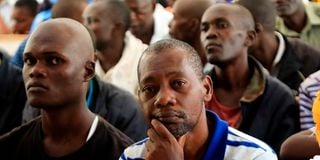Breaking News: Former Lugari MP Cyrus Jirongo dies in a road crash
Premium
State relies on terror law to detain cult leader Mackenzie, followers for up to a year

Kilifi cult leader Paul Mackenzie follows proceedings at the Shanzu Law Courts during the mention of his matter in this file photo.
Kilifi cult leader Paul Mackenzie and his associates could be detained without charge for up to a year, court documents show.
The state has invoked the Prevention of Terrorism Act (POTA), which allows for up to 360 days of extended detention without charge.
Prosecutors have reviewed updated police files on the Shakahola massacre investigation and concluded that it is necessary to continue detaining Mackenzie and his associates.
Documents filed in the Shanzu court show that the prosecution, investigators and the government chemist all agree that the suspects need to be detained for longer to allow investigations to be completed before formal charges are laid.
"The prosecution has reviewed the updated police files, consulted with other agencies involved in the investigation and independently concluded that further detention is necessary and justified," the document states.
The State also argues that charging Mackenzie and his associates with the mass murder in the Shakahola forest would be contrary to the object and purpose of section 50(9) of the Constitution, as enabled by the Victims Protection Act.
In addition, the State maintains that continued detention will ensure a fair and expeditious trial, rather than triggering the trial process prematurely and then asking the courts for more time to complete the investigation.
The investigation into the Shakahola massacre has proven to be complex, arduous, costly and constantly evolving as investigators gradually build on the known facts and work to unravel the unknowns.
In addition, there are new factors that have had a direct impact on the turnaround time for securing critical material evidence, such as badly decomposed bodies that make it difficult to determine the cause of death, and a limited number of reference samples from biological relatives that negatively affect the identification and linking of the deceased with their families.
It has been argued in court that the identification of the victims is crucial for charging decisions, given the different causes of death.
Therefore, the State argues that an additional period of at least six months, as requested, is necessary to ensure the outcome of the scientifically based victim identification process.
"The ongoing investigation is necessary to fill gaps in the evidence and to ensure fair charging decisions. Correct and complete charges will facilitate effective case presentation and management by the courts, thereby expediting the trial process," said Chief Inspector Raphael Wanjohi, who is leading the investigation.
According to data presented in court, 214 people died of starvation, 39 of suffocation, 14 of head injuries, while the cause of death of 115 people remains unknown.
The prosecution has applied for a six-month extension of Mackenzie's and his associates' detention, citing the circumstances of the Shakahola massacre as justification for the maximum period of detention without charge.
"The overwhelming evidence before this court demonstrates that POTA is aimed at crimes such as the Shakahola massacre, where sectarian, Christian-oriented, faith-based violent extremism reveals radicalisation contrary to section 12D of POTA," Deputy Director of Public Prosecutions Jamie Yamina said in court papers.
Although it may appear that Mackenzie and his followers have been detained for an extended period of time, the state has additional time under POTA to extend their detention in order to complete the investigation.
The state has argued that the extension is necessary to prevent the suspects from harming themselves due to their indoctrinated minds and extreme beliefs.
For the first group, comprising Mackenzie and 17 others, the State has 223 days left to continue detention, out of a possible maximum of 360 days from the date of their initial detention, pending the completion of investigations.
In the second group, consisting of Charles Charo alias Musa Suleiman and 10 others, the State has 253 days left to lawfully detain them out of a maximum of 360 days. In the last group, which includes only Alex Mnangwe Odari alias Alex wa Galilaya, the State has 283 days of detention pending completion of investigations.
The State argues that there is no legal obstacle or justification to prevent it from taking this course of action, notwithstanding the discomfort of Mackenzie and his associates.
The State argues that the Shakahola case has prompted interventions aimed at possible policy and legislative reforms. Until these reforms are in place, all evidence must be preserved, not only for the trial, but also in the interests of public safety and national security.
"Until social investigation reports demonstrate the existence of safer alternatives, a prison or detention facility remains the least restrictive measure available to achieve the intended purposes," the prosecutor said.
The State also said it had established that Mackenzie and his associates were indoctrinated or radicalised individuals who required close supervision, care and control.
The Shakahola deaths suspects are due to appear in court later this week.





